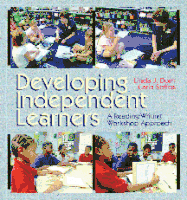 |  | 


The goal of teaching is to promote independent learning so reading and writing becomes a lifelong habit. As children become better readers, they also become better writers. A workshop format provides a literacy context for building connections between the reading and writing processes. In this two-part video series, Donnie Skinner and Vicki Altland demonstrate how they implemented reading and writing workshops in two Arkansas schools.
Tape 1: Exploring Literature in Third Grade
In the first videotape, Donnie Skinner and third-grade students at Boone Park Elementary in North Little Rock, Arkansas, explore how literature is used to promote deeper comprehension during reading and writing workshops. The first part of the tape demonstrates the components of writing workshop, including a mini-lesson for crafting a good lead, independent practice, and writing conferences. The second part of the tape illustrates the components of reading workshop, including a mini-lesson for teaching a visualization strategy, independent practice, reading conferences, and a literature discussion group. The features of the workshop include:
* guided demonstrations and think-aloud;
* guided practice with teacher assistance;
* independent practice with teacher and peer conferences;
* language interactions that promote deeper comprehension.
Tape 2: Conducting Research in First Grade
In the second videotape, Vicki Altland and her first graders at Ida Burns Elementary in Conway, Arkansas, use a workshop approach to conduct research with nonfiction texts. Vicki scaffolds her first graders as they apply a ten-step process for conducting research, including choosing a topic, gathering materials, organizing information, and publishing the results. The features of the workshop include:
* mini-lesson with guided practice;
* group work with teacher conferences;
* group sharing with teacher assessment.
About the Authors�
Linda J. Dorn is Associate Professor at the University of Arkansas at Little Rock, where she directs the Early Literacy Center. She has twenty years of experience in education, including eight years as an elementary classroom teacher. Her most recent work includes the development and implementation of the Arkansas Literacy Coaching Model. Linda conducts summer early literacy institutes for teachers across the United States, and she is a popular conference speaker. She is co-author of Apprenticeship in Literacy (Stenhouse 1998), Shaping Literate Minds (Stenhouse 2001), and Literacy Task Cards (Teaching Resource Center 2001), and author of the four-part video staff development series Organizing for Literacy (Stenhouse 1999).
Carla Soffos is a literacy coach at the University of Arkansas at Little Rock. Her sixteen years in education include eight years as a first grade teacher.
2003. Two videotapes (each is approximately 30 minutes, 1/2" VHS) + Viewing Guide
|
|
